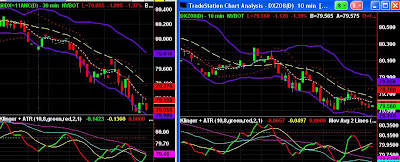Treasury Secretary Hank Paulson fired his bazooka today, after assuring Congress just 2 months ago that having it would ensure that it would never be necessary or used. In fact, it raises memory of other famous (now infamous) statements by Fed and Treasury officials that the financial crises over the past year would never happen. They happened! Remember Paulson's statement that the subprime mortgage mess would remain contained? That was a joke!
The fact is that like other past government bailouts, they do work -- but only short-term, like a band-aid on a hemorrhage. There is a perennial debate between market forces that insist that if left alone, free markets will eventually clean out the mistakes and return to normal, despite pain along the way, and opposing forces that insist that government has an appropriate moderating role. Today, we have seen the latest bailout from Treasury Secretary Paulson. We saw the overnight nationalization of the nation's mortgage system.
How many government rescues and bailouts have we seen since the credit crisis began 13 months ago? I have lost count! And have they prevented the crisis? Or just prolonged it? Have they even slowed it down? It doesn't feel like it! I wonder what would have happened if we had allowed the markets to self-correct as they are intended to do, without constant government interventions. Would we have had a painful recession that would be a historical, distant memory by now? The average recession only lasts 7-9 months! We might have been in recovery by now! From a statistical standpoint, odds are that we would have been. But we continue to flounder instead, stumbling from one bumbling blunder to the next, stubbing our economic toes again and again.
And what industry will be socialized next? Healthcare? Airlines? Autos? Energy and oil? Where will it stop? With all the investment banks? Or the commercial banks? At what point will the government become the biggest business management system in the world, with only token tiny private enterprise left? Whether or not more industries will be nationalized is ultimately irrelevant. The fact is that now, the government can! Overnight!
Why would the government take over your business, or you employer's company? Because it can!
Learn the Lessons of History, America!Americans would be shocked to realize that they are following some of the same steps, and are now on the same path, that Hugo Chavez has done to the Venezuelan economy. But America's socialists are wise enough to realize that as long as they don't call it socialism, they can get away with a lot more socialism. Americans have not been taught to recognize socialism, so they accept it without seeing it for what it is. But a spade is still a spade, whether we call it a scoop... or paint utopian lipstick on the pig and label it as a gleaming silver spoon! Please! Let's call a spade, a spade, and stop deceiving ourselves!
As more and more shortages occur in Venezuela, and more and more economic crises manifest themselves, Chavez' answer to each new crisis is to nationalize the industry. More government! Bigger government! Government is the answer! The answer, he says, is for the government to take over from the greedy, self-serving, inept, inefficient largesse of private businesses and private landowners. He ignores that competition forces private enterprise to be efficient, productive, and to cut margins -- and profits -- to the bone. So things go from bad... to worse. Much worse!
The Venezuelan government just keeps stealing the productive capacities of more and more industries. Food industries, concrete, publishing, shipping, construction, oil production, and on and on. Ranchers are escorted at gunpoint off their own lands, and production plummets 90%! And as each industry is nationalized, production of each industry diminishes even more! And the worse it gets, the more they nationalize! And the more they nationalize, the worse it gets! While the United States hasn't gone that far yet, it should be an ominous sign to Americans that now, it can! It has now empowered itself to do it quickly and easily -- literally, over a weekend! And if it can do it with the mortgage industry and America's largest businesses, it can do it to any industry, and any business! If we are wise, we'll learn from Venezuela's Chavez disaster. But if we're not wise...
"Those who cannot learn from history are doomed to repeat it". George Santayana
We had better be (more) careful what we wish for. We just might get it, and then we'll be really sorry. Not all change is change for the better. And once it happens, and we awaken to realize it is no sleeping nightmare, but instead, a conscious crisis, it may just be too late!












